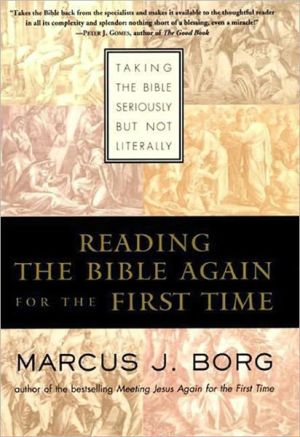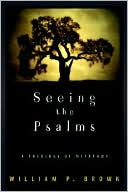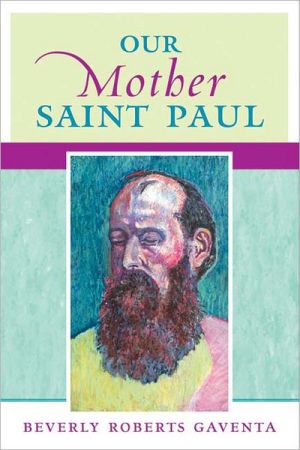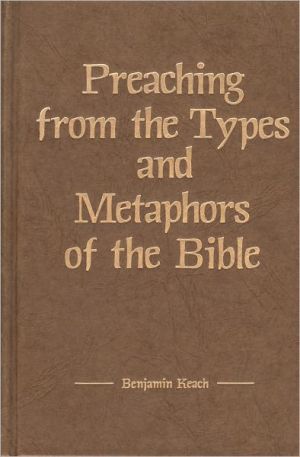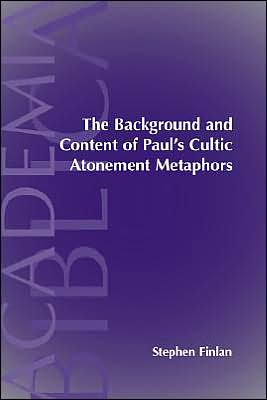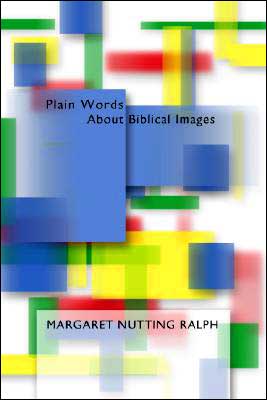Reading the Bible Again For the First Time: Taking the Bible Seriously But Not Literally
One of the vital challenges facing thoughtful people today is how to read the Bible faithfully without abandoning our sense of truth and history. Reading the Bible Again for the First Time provides a much-needed solution to the problem of how to have a fully authentic yet contemporary understanding of the scriptures. Many mistakenly believe there are no choices other than fundamentalism or simply rejecting the Bible as something that can bring meaning to our lives. Answering this modern...
Search in google:
Special e-book features: This PerfectBound e-book contains an exclusive interview with Marcus Borg and in-text hyperlinks to each of his notes and to key passages in the Hebrew Bible and the New Testament. Peter J. Gomes Borg is one of the very few New Testament scholars of our age whose learning is so lucid that it takes the Bible back from the specialists and makes it in all its complexity and splendor available to the thoughtful reader: nothing short of a blessing, even a miracle!
Chapter One\ Reading Lenses:\ Seeing the Bible Again\ The key word in the title of this book — Reading the Bible Again for the First Time — is "again." It points to my central claim. Over the past century an older way of reading the Bible has ceased to be persuasive for millions of people, and thus one of the most imperative needs in our time is a way of reading the Bible anew.\ Reading and seeing go together. On the one hand, what we read can affect how we see. On the other hand, and more important for my immediate purpose, how we see affects how we read. What we bring to our reading of a text or document affects how we read it. All of us, whether we use reading glasses or not, read through lenses.\ As we enter the twenty-first century, we need a new set of lenses through which to read the Bible. The older set, ground and polished by modernity, no longer works for millions of people. These lenses need to be replaced. The older way of seeing and reading the Bible, which I will soon describe, has made the Bible incredible and irrelevant for vast numbers of people. This is so not only for the millions who have left the church in Europe and North America, but also for many Christians who continue to be active in the life of the church.\ The need for new lenses thus exists within the church itself. The older lenses enabled Christians of earlier generations to experience the Bible as a lamp unto their feet, a source of illumination for following the Christian path. But for many Christians in our time, the older lenses have become opaque, turning the Bibleinto a stumbling block in the way. Yet not all Christians agree about the need for new lenses. Many vigorously defend the older way of seeing the Bible. For them, what seems to be at stake is nothing less than the truth of the Bible and Christianity itself.\ Conflicting Lenses\ Conflict about how to see and read the Bible is the single greatest issue dividing Christians in North America today. On one side of the divide are fundamentalist and many, conservative-evangelical Christians. On the other side are moderate-to-liberal Christians, mostly in mainline denominations. Separating the two groups are two very different ways of seeing three foundational questions about the Bible: questions about its origin, its authority, and its interpretation.\ The first group, who sometimes call themselves "Bible-believing Christians," typically see the Bible as the inerrant and infallible Word of God. This conviction flows out of the way they see the Bible's origin: it comes from God, as no other book does. As a divine product, it is God's truth, and its divine origin is the basis of its authority. As a contemporary bumper sticker boldly puts it, "God said it, I believe it, that settles it." The sticker may be unfair to many who hold this position, but it was created by an advocate, not by a critic.\ For these Christians, the Bible is to be interpreted literally, unless the language of a particular passage is clearly metaphorical. From their point of view, allowing nonliteral interpretation opens the door to evading the Bible's authority and making it say what we want it to say. They typically see themselves as taking the Bible with utmost seriousness and often criticize moderatete-to-liberal Christians for watering it down and avoiding its authority. They also commonly see themselves as affirming "the old-time religion" — that is, Christianity as it was before the modern period. In fact, however, as we shall see, their approach is itself modern, largely the product of a particular form of nineteenth-and twentieth-century Protestant theology. Moreover, rather than allowing the Bible its full voice, their approach actually confines the Bible within a tight theological structure.\ The second group of Christians, most of whom are found in mainline churches, are less clear about how they do see the Bible than about how they do not. They are strongly convinced that many parts of the Bible cannot be taken literally, either as historically factual or as expressing the will of God. Some people who reach this conclusion leave the church, of course. But many continue within the church and are seeking a way of seeing the Bible that moves beyond biblical literalism and makes persuasive and compelling sense.\ Their numbers are growing; never before has there been so great an appetite for modern biblical scholarship among mainline Christians. They are responding strongly and positively to a more historical and metaphorical reading of the Bible. At the grass-roots level of mainline churches, a major de-literalization of the Bible is underway.\ Though these Christians know with certainty that they cannot be biblical literalists, they are less clear about how they do see the origin and authority of the Bible. They are often uncertain what it means to say that the Bible is "the Word of God" or "inspired by God." Though they reject grounding the Bible's authority in its infallibility, they are unsure what "biblical authority" might mean.\ Thus it is not surprising that even within mainline denominations, there is conflict about how to see and read the Bible. At the national level, most of these denominations have vocal minority movements protesting what they perceive to be the loss of biblical authority. At the local level, some congregations are sharply divided about how to see the Bible. The conflict also divides families. In many conservative Christian families, one or more members have either dropped out of church or become part of a liberal church. The reverse is also true: many liberal Christian families have seen one or more of their members become conservative Christians. Some families have been able to negotiate this conflict with grace. But in many, it has been a source of division, grief, and hand-wringing.\ Reading the Bible Again For the First Time . Copyright © by Marcus J. Borg. Reprinted by permission of HarperCollins Publishers, Inc. All rights reserved. Available now wherever books are sold.
PrefaceixPart 1Foundations1Reading Lenses: Seeing the Bible Again32Reading Lenses: The Bible and God213Reading Lenses: History and Metaphor37Part 2The Hebrew Bible4Reading the Creation Stories Again575Reading the Pentateuch Again856Reading the Prophets Again1117Reading Israel's Wisdom Again145Part 3The New Testament8Reading the Gospels Again1859Reading Paul Again22710Reading Revelation Again265Epilogue297Subject Index303Modern Author Index313Scripture Index317
\ Peter J. Gomes"[T]akes the Bible back from the specialists…nothing short of a blessing, even a miracle!"\ \ \ \ \ Karen Armstrong"Borg’s analysis is profound, challenging and engrossing; it will enable readers to use scripture creatively once again and truly make it a bridge for the divine."\ \ \ Rabbi"This welcome book removes many of the barriers that separate thoughtful people from the wisdom of the Bible."\ \ \ \ \ Christian Century"[A]n accessible book, almost entirely devoid of scholarly jargon but filled with scholarly insight."\ \ \ \ \ Christian Science Monitor"Borg writes passionately about the enduring values of the Bible. The engaging historical details he includes make familiar stories read like new. Whether you read the Bible religiously or rarely, this book is thought-provoking."\ \ \ \ \ Spirituality and Practice"Borg… has a knack for clarifying difficult theological issues and writing in a pensive style that is extremely accessible to Christian laity and seekers of all stripes. Almost single-handedly, he opened up new avenues of thought for lapsed or nonbelievers interested in re-visioning the Christianity of their childhood."\ \ \ \ \ Lawrence KushnerMarcus Borg's Reading the Bible Again for the First Time is an easy, wise and deeply spiritual stroll through the Mother of all Books. Borg deftly guides the reader-Christian and Jew, conservative and liberal alike-around the landmines and toward the treasures strewn over the biblical landscape. Here is a superb introduction for the beginning and intermediate student. Borg's teaching resonates with the counsel of the ancient rabbis that eachperson standing at the foot of Mount Sinai heard a revelation uniquely tailored for his or her own level of awareness and life-situation.\ \ \ \ \ Karen ArmstrongIn a literal-minded age, when people read texts only for information and have lost the ability to read scripture in the traditional way, this book will make an invaluable contribution. Borg's analysis is profound, challenging and engrossing; it will enable readers to use scripture creatively once again and truly make it a bridge for the divine.\ \ \ \ \ Harold KushnerThis welcome book removes many of the barriers that separate thoughtful people from the wisdom of the Bible.\ \ \ \ \ Peter J. GomesBorg is one of the very few New Testament scholars of our age whose learning is so lucid that it takes the Bible back from the specialists and makes it in all its complexity and splendor available to the thoughtful reader: nothing short of a blessing, even a miracle!\ \ \ \ \ Publishers WeeklyThe title of this book comes from the author's experience of "unlearning" his literal reading of the Bible from childhood in favor of a "historical-metaphorical" reading derived from his 35 years of studying the Bible as an academic. Borg, an Episcopalian who teaches at Oregon State University, is a member of the Jesus Seminar, author of The God We Never Knew and the counterpoint to evangelical N.T. Wright in The Meaning of Jesus: Two Views. Borg offers a highly readable and succinct introduction to biblical criticism, outlining the kinds of cultural, theological and historical lenses through which people read the Bible and explaining how those readings affect their relation to God. The historical-metaphorical reading that Borg presents includes both the "historical illumination of a text in its ancient context" and a metaphorical approach that "enables us to see and affirm meanings that go beyond the particularity of what the texts meant in their ancient setting." He applies this approach to the Bible in sections, wending his way from the creation stories to Revelation even as he advocates a journey from "precritical naivete" (the acceptance that the Bible is literally true) through "critical thinking" to "postcritical naivete" (accepting again that the Bible is true even if that truth does not depend upon factuality). The book is copiously footnoted without being in the least stodgy, and is open about Borg's own spiritual journey without being didactic or disrespectful of the tradition he has left. (Mar.) Copyright 2001 Cahners Business Information.\ \ \ \ \ Library JournalBorg (religion, Oregon State Univ.) initially understood the Bible as the authoritative word of God and later saw it through the lens of modern critical thinkers. Now he has moved on to see the Bible with a postmodernist perspective. Reading biblical stories, he finds the truth in events to be the truth of metaphors; in this, he has discovered a path free from "spiritual bondage to the lords of convention and culture." Readings become a "sacramental" and "relational" experience of the presence of God, affirming that, as in the sacrament of communion, the Spirit of God addresses us "in, with, and under" the human words of the Bible. The book provides many excellent metaphorical readings of biblical accounts, which unify the Bible's stories. Borg's thinking and judgments are highly subjective, however, and the themes he chooses to promote are freedom and political correctness. In doing so, he completely ignores the Bible's dominant, redemptive theme that culminates in Jesus Christ. Recommended for large public libraries. George Westerlund, formerly with Providence P.L. Copyright 2001 Cahners Business Information.\ \
